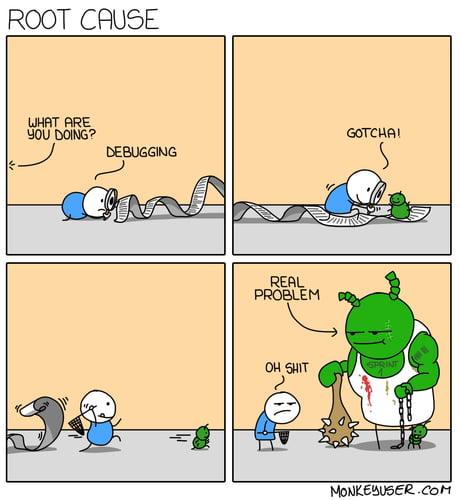Cops Told ‘Don’t Look’ at New iPhones to Avoid Face ID Lock-Out – Motherboard
— Weiterlesen motherboard.vice.com/amp/en_us/article/5984jq/cops-dont-look-iphonex-face-id-unlock-elcomsoft
Category: Uncategorized
-
Cops Told ‘Don’t Look’ at New iPhones to Avoid Face ID Lock-Out – Motherboard
-
Root Cause Analysis

Root Cause monkeyuser.com
-
In Soviet Russia, Silicon Valley is not utopia.
Anton Troynikov summarises the similarities. (Thread)
Things that happen in Silicon Valley and also the Soviet Union:
– waiting years to receive a car you ordered, to find that it's of poor workmanship and quality
– promises of colonizing the solar system while you toil in drudgery day in, day out
— anton (𝔴𝔞𝔯𝔱𝔦𝔪𝔢) (@atroyn) July 5, 2018
-
On the Internet, nobody knows you’re a dog – Wikipedia
Published July 5th, 1993 by The New Yorker, 25 years later this is still relevant.
Source: On the Internet, nobody knows you’re a dog – Wikipedia
-
Economists worry we aren’t prepared for the fallout from automation – The Verge
Aus der Kategorie “Auf dem Arbeitsmarkt der Zukunft sind wir alle überflüssig” heute: Ökonomen sind alle beunruhigt, dass wir so als Gesellschaft auf die kommende Automatisierung und Machtübernahme durch Maschinen nicht richtig vorbereitet sind.
Source: Economists worry we aren’t prepared for the fallout from automation – The Verge
-
While Trump fights over aluminum and steel, Silicon Valley braces for a real trade war
 Some fear a broader clash with China over the theft of technologies that are driving the future of the global economy.
Some fear a broader clash with China over the theft of technologies that are driving the future of the global economy.Trump introducing tariffs on steel and aluminium has dominated the economic and political news in the past days. While consequences on global economy are undoubtable, the steel industry has been in a long known shape. US technology giants, that have seen enormous growth only in the past 20 years and define a whole new industry, are much more worried about capital inflow from China and future growth limitations. The largest US technology companies do not operate in China, while Alibaba, Tencent and Baidu themselves have become multi-billion dollar businesses.
Source: While Trump fights over aluminum and steel, Silicon Valley braces for a real trade war
-
Innovation in Organisation
Digitalisierung ist als Schlagwort allgegenwärtig. Trotzdem bedeutet es nichts anderes als grundlegende, marktwirtschaftliche Kunden- bzw. Marktorientierung. Lediglich die Geschwindigkeit, die notwendig ist, als Marktteilnehmer mit sich ändernden Marktsituationen auseinanderzusetzen stellt besonders große Organisationen vor eine Herausforderung.
Organisation wird in der Regel mit dem Ziel gebildet, um ein Produkt oder einen Service einer breiteren Kunden-Gruppe anbieten zu können und damit Skaleneffekte zu erzielen. Ein fertig entwickeltes, bestehendes Angebot wird in der Regel industriell gefertigt, von einer horizontal skalierten und auf das Angebot geschulten Salesforce vertrieben. Alle Abläufe zu Herstellung und Vertrieb genau dieses Produktes können gemessen und hinsichtlich Kosten und Gewinn optimiert werden. Das ist auch, was anerkannte Business Schulen in der Regel lehren.
Innovation dagegen findet häufig in einem technischen Zusammenhang statt, mit einem herangehen, in dem zwar die Idee und das Ziel feststehen, noch nicht aber alle Schritte feststehen die zu diesem Ziel führen können. In einem kreativen Chaos, das es erlaubt, werden auf dem Weg kurzfristige Richtungsänderungen umgesetzt, das Ziel stets vor Augen.
Es ist nicht in das Korsett starrer “Business Prozesse” eingebunden. Die bestehenden Prozesse sind in der Regel auch langsam entstanden, führen aber zu anderen Zielen. Organisation und Innovation finden mit unterschiedlichen Zielen statt.
Digitalisierung fordert aber beides von Wettbewerbern, die im Markt bestehen wollen und Ihren Kunden passende, innovative Lösungen anbieten möchten. Das fordert ein Umdenken in beiden Bereichen.
-
#GoogleCloudSummit 2017 in Munich
While Amazon Web Services reported another record quarter with $4,53B in October 2017, and Microsoft reporting 93% growth of their cloud business, Google is the third major player in the market for cloud services.
At the same time, Google is not (yet) explicitly reporting numbers on their cloud offering. However, “all other” businesses, including Play Store, also showed impressive 42% growth recently.
To demonstrate how serious the company is about their cloud products, Google demonstrated their commitment in roadshows, the Google Cloud Summit. Among others, like in Paris or Singapore, the Summit was held in Munich On December 6th in the MOC Munich.
Following a keynote between 9am an 11am, Google prepared 4 tracks covering diverse, cloud oriented topics in the areas of Application Development, Big Data & Machine Learning, Infrastructure & Operations, Startup. These tracks had continuous talks between 11am and 6pm, touching all topics from the field you could think of, starting with containers, docker and Kubernetes, going over IoT and Industry 4.0, touching Artificial Intelligence and Machine Learning, to Data Loss Protection and GDPR. All that along with Innovation and Agility in the context of security and privacy.
To round up the event, outside the track rooms had an exhibition of selected cloud partners, from consultancy to implementation service, but also SaaS offerings leveraging the Google Cloud Platform.
While the market news seem that Google is late to the game, their commitment and quality of offering surely put them in an interesting spot and an alternative to the other two cloud vendors. The cloud summit definitely answered questions on Googles capabilities.
-
Customer Questions
Working as an IoT Product Manager you have to listen to your customers questions.
sometimes, you gotta ask yourself important questions.
Like, how do I put a light bulb on a isolated VLAN so it doesn't hack my TV?
— Paul Querna (@pquerna) April 30, 2017
-
robotic loop
Calling it an “accurate representation of whole western capitalist society” is a bit far reached, but it will trigger associations for the urban, corporate employed citizen. Everything working makes the journey very convenient, but go in circles.
http://imgur.com/gallery/6e2XRNM
via Nerdcore.


